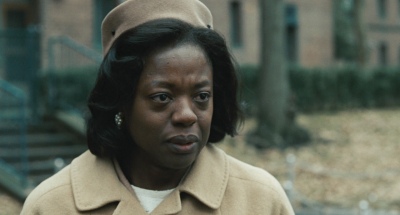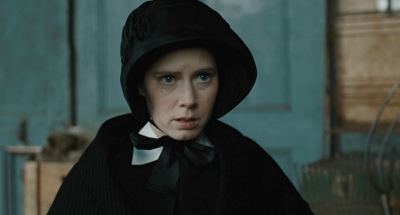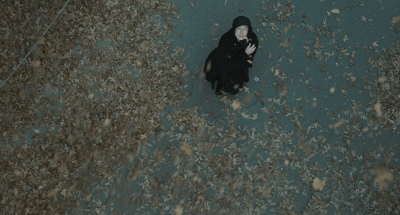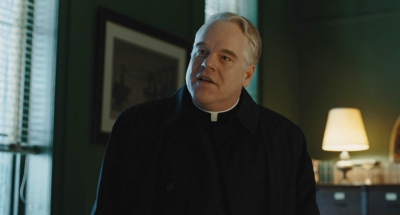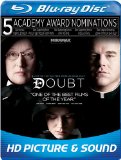| Reviews & Columns |
|
Reviews DVD TV on DVD Blu-ray 4K UHD International DVDs In Theaters Reviews by Studio Video Games Features Collector Series DVDs Easter Egg Database Interviews DVD Talk Radio Feature Articles Columns Anime Talk DVD Savant Horror DVDs The M.O.D. Squad Art House HD Talk Silent DVD
|
DVD Talk Forum |
|
|
| Resources |
|
DVD Price Search Customer Service #'s RCE Info Links |
|
Columns
|
|
|
Doubt
Miramax // PG-13 // April 7, 2009
List Price: $34.99 [Buy now and save at Amazon]
Faith
and doubt are flipsides of the same coin, each defined in terms of the other. Faith is unwavering certainty in the absence of absolute knowledge; doubt sees that moral certainty buckle and sway. John Patrick Shanley, adapting his universally acclaimed play, recognizes that when a question is definitively answered, both faith and doubt cease to be part of the equation. One of the great strengths of Doubt is that it doesn't provide any simple, unambiguous answers. The answers, as well as the questions themselves, are as colored by one's beliefs and personal perspectives as faith and doubt themselves. This is a film whose central crisis can be interpreted with absolute certainty by one viewer, and another may respond entirely differently but with equal conviction. Doubt seeks to challenge, provoking thought and discussion in a way few films do.
Doubt is set at the St. Nicholas Church School in the Bronx shortly before Christmas 1964, with a nation still reeling from the assassination of John F. Kennedy a year earlier. It's a time of change for the Catholic church, one that's embraced by the forward-thinking Father Flynn (Philip Seymour Hoffman) but is met with a disapproved scowl by Sister Aloysius (Meryl Streep). Aloysius is a cold, detached disciplinarian who views these traditions as sacred, not to be meddled with to pander to Catholics who've dismissed their church with an indifferent shrug. She sneers down at the children around her with mistrust as if they're disobedient animals that need to be corralled and tamed. Flynn -- who'd just delivered a heretical sermon about the uniting power of doubt that Aloysius' station prevents her from criticizing -- doesn't escape her frigid gaze either. Though she nimbly dances around saying it outright for much of the film, Aloysius suspects Flynn of improper conduct with an altar boy, who, it just so happens, is the first black student in the school's history. She asks a bright-eyed, optimistic, and impressionable newcomer by the name of Sister James (Amy Adams) to keep a watchful eye out for anything suspicious. The evidence she reports back with is hardly damning and is easily explained away, but it's more than sufficient to cement Aloysius' absolute certainty of Flynn's unforgivable wrongdoings. Doubt from there is rooted around a series of impassioned arguments between Flynn and Aloysius, with neither willing to yield or even acknowledge the slightest glimmer of validity to the other's stance.
This isn't
a stock procedural where some new revelation into the mystery is brought to light like clockwork every twenty minutes to disrupt the audience's footing. No, Doubt is far more firmly rooted in belief and faith than in cinematic conventions. The greatest strength of the construction of the story itself is that Doubt doesn't nudge those watching towards any direction in particular. Two viewers could examine the same piece of evidence and come away with diametrically opposing yet equally valid interpretations. The film invites snap judgments and encourages viewers to upend whatever stance they'd happened to land on; even Sister James -- the idealistic neophyte who serves as the eyes and voice of the audience -- finds herself swayed towards both sides of this argument at varying times. While most films lean on red herrings as a crutch and triple-underline their moral messages to ensure that there's no lingering trace whatsoever of ambiguity, Doubt has the restraint and confidence to aim for something greater. Regardless of whether one sides with Father Flynn or is more compelled by Aloysius' unwavering certainty, there is no right or wrong answer. This could be maddening to those who look at film as escapist entertainment, but I find being challenged in this way to be a deeply appreciated change of pace. Doubt demands to be seen and discussed with others, and it rewards further viewings; exposure to these sorts of alternate perspectives can color one's take on the film and cause the same imagery and ideas to be reinterpreted in altogether different ways.
All four of Doubt's key actors were nominated for Academy Awards and deservedly so. Meryl Streep is, as ever, a revelation. She wholly escapes into Sister Aloysius, a role that a lesser actress would almost certainly have overplayed with seething frigidity. Adopting a thoroughly convincing accent, Aloysius is a stiff, rigid, almost snarling disciplinarian when she feels compelled to wear the warpaint of Mother Superior. When she's in a room alone with Sister James or Father Flynn, however, she's alternately cool and collected -- with certainty and a sense of moral superiority come a certain level of comfort -- and explosive. One gets the sense that Aloysius is herself as skilled at the art of performance as Streep, recognizing that it's not the fire or intensity that necessarily makes the greatest impact but having the restraint to reserve unleashing it until the right time. Depending on the biases of a particular member of the audience, Aloysius is either confident and committed or irrationally obstinant, and she's infused with just enough of a spark of warmth and humanity that her stance can never be wholly dismissed.
The interplay
between Aloysius and Flynn as they face off is central to Doubt, and the film demands that whoever steps into the role of the priest at least be able to match the authority and presence that Meryl Streep exudes. It's a daunting prospect but one Philip Seymour Hoffman is sufficiently accomplished to field. Flynn is a dazzlingly engaging presence on the pulpit, astonishingly charismatic in less formal settings, and incendiary when cornered by an unyielding Aloysius. Flynn is shown throughout the film to be warm and likeable enough to immediately set most of those around him at ease, and yet there's something just off-kilter enough about him to sow these seeds of suspicion.
Amy Adams' turn as Sister James is understated by comparison but makes an enormous impression just the same. The role James is reluctantly saddled with is to quietly judge rather than accuse, and it's heartbreaking to watch her transformation from a meek optimist hiding behind an inconfident half-smile to barking at her class and being tormented at the sight of what she'd instigated with the best of intentions. Viola Davis only appears in the film briefly as the mother of the boy in question, but her extended conversation with Sister Aloysius is emotionally devastating, and it adds a perspective and additional dimension to the nature of the conflict that I would never have thought possible. This is a film that simply could not be set in the here and now; it'd be an entirely different story without the racial undercurrent a backdrop of 1964 offers, and there's a level of innocence in children from decades past that seems to have evaporated in this jaded era.
Just to be clear, Doubt isn't a story about pedophilia or casting any sort of pall on the Catholic church. It is, as the title suggests, about doubt and, in turn, faith and certainty. Doubt possesses the confidence to let the power of the performances drive the film rather than allow itself to be manuevered by rote plot points or heavy-handed proselytizing. It's not a cautionary tale about the ravaging effects of unyielding certainty and by no means dismisses the need for caution and vigilance; there's some element of both that must be acknowledged. Doubt never lets itself become ensnared in the winding gears of the machinations of its story, opting instead to let the film be propelled by exceptionally powerful performances and these multidimensional, deeply rendered, and thoroughly convincing characters. Doubt never allows itself to settle into any sort of convention or cliché. This is a film that is never less than enthralling, consistently gripping on both an emotional and an intellectual level. Doubt easily ranks among the most exceptional films of 2008, and not only is it an essential discovery on Blu-ray, but the layers that are exposed with each successive viewing cry out for it to be watched again and again. Highly Recommended.
Video
Roger Deakins' exceptionally keen visual eye made No Country for Old Men one of the most instantly arresting releases on Blu-ray, and his cinematography for Doubt is no less dazzling. Its cold palette reflects the forboding tone of the film, and as director John Patrick Shanley notes in his audio commentary, the largely monochromatic colors and spare backdrops bring the performances that much closer to the foreground. Black levels are consistently robust, and the image is bolstered by a remarkable sense of depth and dimensionality. The level of clarity and detail on display is similarly outstanding, and Doubt stands strong as one of the more remarkable looking day-and-date releases of recent memory. There are no discernable flaws to be found at all, and this Blu-ray disc doesn't suffer from any awkward processing or filtering, retaining Doubt's unintrusive but marvelously filmlike texture throughout.
Doubt is lightly letterboxed to preserve its theatrical aspect ratio of 1.85:1, and its AVC encode spills over slightly into the second layer of this Blu-ray disc.
Audio
Doubt's startlingly beautiful visuals are complemented by an equally exceptional 24-bit DTS-HD Master Audio soundtrack. Being adapted from a fairly claustrophobic stage play would lead one to expect a mix dominated by the front speakers, but Doubt's sound design is remarkably lush and organic. The surround channels are brimming with atmosphere, and torrential rain and the relentless rustle of leaves contribute to its looming, ominous tone. The rears also effectively flesh out the film's backdrop of the Bronx circa 1964. The sound design remains impressive in the interiors as well, from the organ enveloping the room to the reverb of Father Flynn's sermons thundering throughout the cavernous church. Doubt is predominately a dialogue-driven film and is accompanied by a suitably restrained score by Howard Shore, but just the same, the mix is consistently rich and full-bodied. Its line readings, whether whispered or bellowed, are consistently rendered cleanly and clearly. Doubt's approach as a film is to recognize that an image, a sound, or a performance can be both understated and powerful, and its sound design is much the same way. Subtle yet enveloping and wholly immersive, Doubt's audio accentuates the film's greatest strengths, making far more of an impact than a blander, more traditional mix likely would have.
The packaging for Doubt only lists subtitles in English (SDH) and Spanish, but the selection on the disc itself is far more extensive. Dolby Digital 5.1 dubs are also offered in French and Portuguese.
Extras
The Final Word
Masterfully crafted and certain to spark thoughtful, impassioned discussions afterwards, Doubt easily ranks among the most exceptional films of 2008. This is a work that rewards repeat viewings, and that coupled with its strong technical presentation and a fair number of quality extras make for a remarkably compelling purchase on Blu-ray. Highly Recommended.
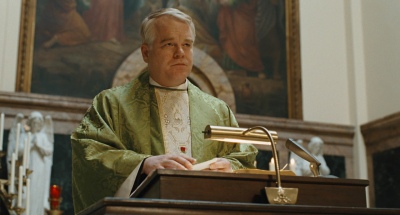 |
| [click on the thumbnail to enlarge] |
Doubt is set at the St. Nicholas Church School in the Bronx shortly before Christmas 1964, with a nation still reeling from the assassination of John F. Kennedy a year earlier. It's a time of change for the Catholic church, one that's embraced by the forward-thinking Father Flynn (Philip Seymour Hoffman) but is met with a disapproved scowl by Sister Aloysius (Meryl Streep). Aloysius is a cold, detached disciplinarian who views these traditions as sacred, not to be meddled with to pander to Catholics who've dismissed their church with an indifferent shrug. She sneers down at the children around her with mistrust as if they're disobedient animals that need to be corralled and tamed. Flynn -- who'd just delivered a heretical sermon about the uniting power of doubt that Aloysius' station prevents her from criticizing -- doesn't escape her frigid gaze either. Though she nimbly dances around saying it outright for much of the film, Aloysius suspects Flynn of improper conduct with an altar boy, who, it just so happens, is the first black student in the school's history. She asks a bright-eyed, optimistic, and impressionable newcomer by the name of Sister James (Amy Adams) to keep a watchful eye out for anything suspicious. The evidence she reports back with is hardly damning and is easily explained away, but it's more than sufficient to cement Aloysius' absolute certainty of Flynn's unforgivable wrongdoings. Doubt from there is rooted around a series of impassioned arguments between Flynn and Aloysius, with neither willing to yield or even acknowledge the slightest glimmer of validity to the other's stance.
This isn't
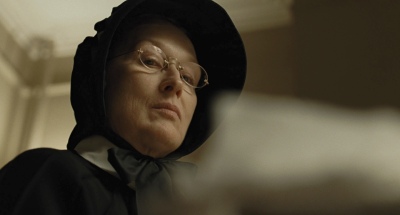 |
| [click on the thumbnail to enlarge] |
All four of Doubt's key actors were nominated for Academy Awards and deservedly so. Meryl Streep is, as ever, a revelation. She wholly escapes into Sister Aloysius, a role that a lesser actress would almost certainly have overplayed with seething frigidity. Adopting a thoroughly convincing accent, Aloysius is a stiff, rigid, almost snarling disciplinarian when she feels compelled to wear the warpaint of Mother Superior. When she's in a room alone with Sister James or Father Flynn, however, she's alternately cool and collected -- with certainty and a sense of moral superiority come a certain level of comfort -- and explosive. One gets the sense that Aloysius is herself as skilled at the art of performance as Streep, recognizing that it's not the fire or intensity that necessarily makes the greatest impact but having the restraint to reserve unleashing it until the right time. Depending on the biases of a particular member of the audience, Aloysius is either confident and committed or irrationally obstinant, and she's infused with just enough of a spark of warmth and humanity that her stance can never be wholly dismissed.
The interplay
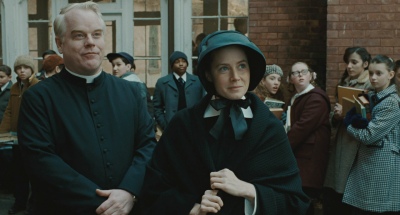 |
| [click on the thumbnail to enlarge] |
Amy Adams' turn as Sister James is understated by comparison but makes an enormous impression just the same. The role James is reluctantly saddled with is to quietly judge rather than accuse, and it's heartbreaking to watch her transformation from a meek optimist hiding behind an inconfident half-smile to barking at her class and being tormented at the sight of what she'd instigated with the best of intentions. Viola Davis only appears in the film briefly as the mother of the boy in question, but her extended conversation with Sister Aloysius is emotionally devastating, and it adds a perspective and additional dimension to the nature of the conflict that I would never have thought possible. This is a film that simply could not be set in the here and now; it'd be an entirely different story without the racial undercurrent a backdrop of 1964 offers, and there's a level of innocence in children from decades past that seems to have evaporated in this jaded era.
Just to be clear, Doubt isn't a story about pedophilia or casting any sort of pall on the Catholic church. It is, as the title suggests, about doubt and, in turn, faith and certainty. Doubt possesses the confidence to let the power of the performances drive the film rather than allow itself to be manuevered by rote plot points or heavy-handed proselytizing. It's not a cautionary tale about the ravaging effects of unyielding certainty and by no means dismisses the need for caution and vigilance; there's some element of both that must be acknowledged. Doubt never lets itself become ensnared in the winding gears of the machinations of its story, opting instead to let the film be propelled by exceptionally powerful performances and these multidimensional, deeply rendered, and thoroughly convincing characters. Doubt never allows itself to settle into any sort of convention or cliché. This is a film that is never less than enthralling, consistently gripping on both an emotional and an intellectual level. Doubt easily ranks among the most exceptional films of 2008, and not only is it an essential discovery on Blu-ray, but the layers that are exposed with each successive viewing cry out for it to be watched again and again. Highly Recommended.
Video
Roger Deakins' exceptionally keen visual eye made No Country for Old Men one of the most instantly arresting releases on Blu-ray, and his cinematography for Doubt is no less dazzling. Its cold palette reflects the forboding tone of the film, and as director John Patrick Shanley notes in his audio commentary, the largely monochromatic colors and spare backdrops bring the performances that much closer to the foreground. Black levels are consistently robust, and the image is bolstered by a remarkable sense of depth and dimensionality. The level of clarity and detail on display is similarly outstanding, and Doubt stands strong as one of the more remarkable looking day-and-date releases of recent memory. There are no discernable flaws to be found at all, and this Blu-ray disc doesn't suffer from any awkward processing or filtering, retaining Doubt's unintrusive but marvelously filmlike texture throughout.
Doubt is lightly letterboxed to preserve its theatrical aspect ratio of 1.85:1, and its AVC encode spills over slightly into the second layer of this Blu-ray disc.
Audio
Doubt's startlingly beautiful visuals are complemented by an equally exceptional 24-bit DTS-HD Master Audio soundtrack. Being adapted from a fairly claustrophobic stage play would lead one to expect a mix dominated by the front speakers, but Doubt's sound design is remarkably lush and organic. The surround channels are brimming with atmosphere, and torrential rain and the relentless rustle of leaves contribute to its looming, ominous tone. The rears also effectively flesh out the film's backdrop of the Bronx circa 1964. The sound design remains impressive in the interiors as well, from the organ enveloping the room to the reverb of Father Flynn's sermons thundering throughout the cavernous church. Doubt is predominately a dialogue-driven film and is accompanied by a suitably restrained score by Howard Shore, but just the same, the mix is consistently rich and full-bodied. Its line readings, whether whispered or bellowed, are consistently rendered cleanly and clearly. Doubt's approach as a film is to recognize that an image, a sound, or a performance can be both understated and powerful, and its sound design is much the same way. Subtle yet enveloping and wholly immersive, Doubt's audio accentuates the film's greatest strengths, making far more of an impact than a blander, more traditional mix likely would have.
The packaging for Doubt only lists subtitles in English (SDH) and Spanish, but the selection on the disc itself is far more extensive. Dolby Digital 5.1 dubs are also offered in French and Portuguese.
Extras
- From Stage to Screen (19 min.; HD): The lengthiest and most comprehensive of Doubt's four featurettes, "From Stage to Screen" opens as writer/director John Patrick Shanley explores the genesis of his play which stemmed from the single word of its title. Shanley also discusses watching the play with one of the nuns who'd inspired it and describes a number of the difficulties encountered in adapting Doubt into a feature film. From there, "From Stage to Screen" is rooted primarily around behind-the-scenes footage and detailed interviews with the cast, delving in depth into each individual character and performance. This is an exceptional look at the making of the film and is far more thorough and sincere than these sorts of featurettes generally allow.
- The Cast of Doubt (14 min.): The questions posed to Doubt's four stars in this roundtable interview are fairly straightforward and bland, but their responses are considerably more thoughtful. Hoffman and Streep carry the bulk of this discussion, distinguishing between the play and this feature film adaptation, how theater challenges audiences in a way to which filmgoers are largely unaccustomed, and how Doubt can be so readily interpreted in entirely different ways depending on the viewers' beliefs and personal perspectives. Although this roundtable is rendered in HD, the excerpts from the film as well as the interviews themselves are upconverted from standard definition.
- Scoring Doubt (5 min.; HD): This featurette with Howard Shore delves into the collaborative thought process behind the film's score, rooting cues behind themes and character moments rather than action and plot, and ensuring that the music is neutral enough to avoid leading the audience down a certain path.
- Sisters of Charity (6 min.; HD): The last of the disc's featurettes interviews several nuns who were part of the Sisters of Charity in the time in which Doubt is set. Along with noting their reactions to the film, these four nuns discuss the history of their sisterhood, their daily rituals, and how the sweeping changes that were first instituted in 1962 -- shortly before Doubt takes place -- irrevocably transformed the established order.
- Audio Commentary: Writer/director John Patrick Shanley shoulders Doubt's commentary track on his own, and the result is extraordinary. This conversation alternates between notes about the construction of the story, a slew of detailed comments and anecdotes from his childhood that help put some of the imagery and situations in an additional context, and a few technical and directorial notes as well. Although Shanley is somewhat quieter throughout the second half of the film, this is a remarkably thorough discussion that's never less than engaging, from offhand comments like "kids were so much younger then" to coming up with a closely guarded backstory for Father Flynn. This commentary is an essential listen for admirers of the film.
The Final Word
Masterfully crafted and certain to spark thoughtful, impassioned discussions afterwards, Doubt easily ranks among the most exceptional films of 2008. This is a work that rewards repeat viewings, and that coupled with its strong technical presentation and a fair number of quality extras make for a remarkably compelling purchase on Blu-ray. Highly Recommended.
|
| Popular Reviews |
| Sponsored Links |
|
|
| Sponsored Links |
|
|
| Release List | Reviews | Shop | Newsletter | Forum | DVD Giveaways | Blu-Ray | Advertise |
|
Copyright 2024 DVDTalk.com All Rights Reserved. Legal Info, Privacy Policy, Terms of Use,
Manage Preferences,
Your Privacy Choices | |||||||









